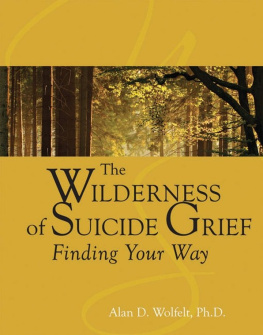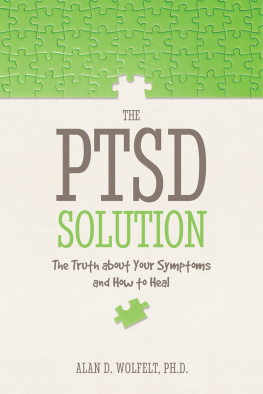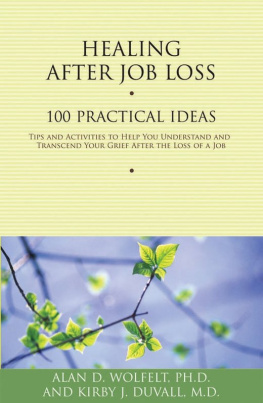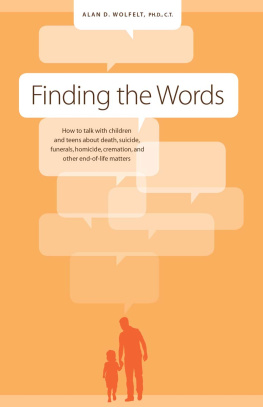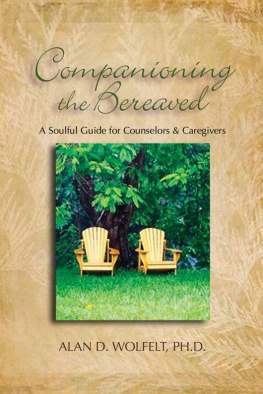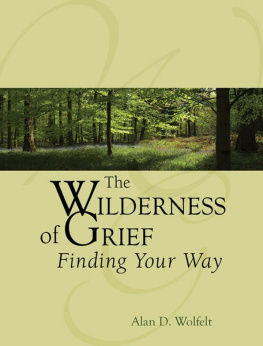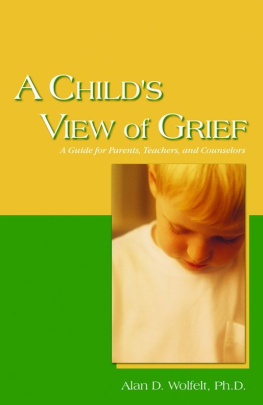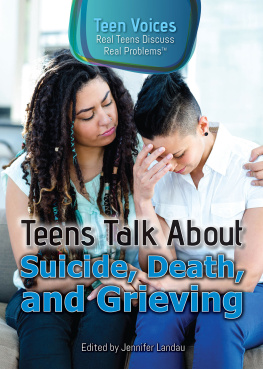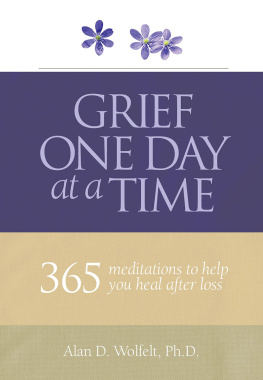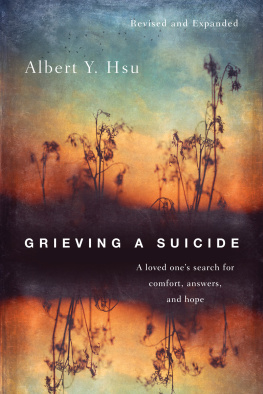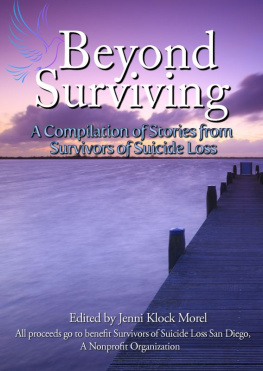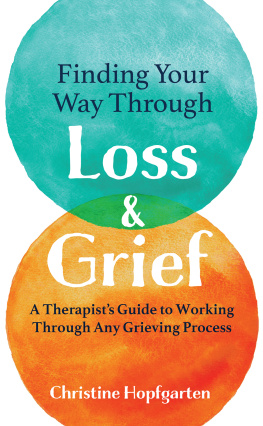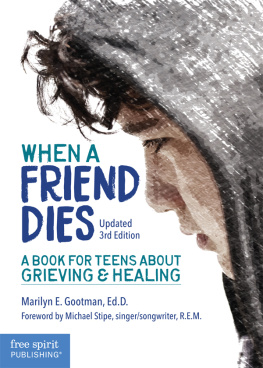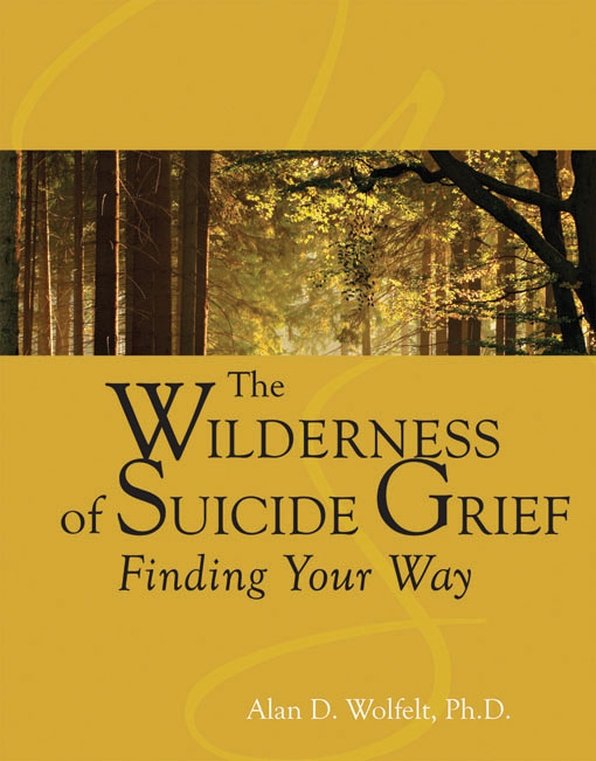About the Author
Author, educator, and grief counselor Dr. Alan Wolfelt is known across North America for his compassionate philosophy of companioning versus treating mourners. He is committed to helping people mourn well so they can go on to live well and love well.
Dr. Wolfelt is founder and Director of the Center for Loss and Life Transition, located in the beautiful mountain foothills of Fort Collins, Colorado. Past recipient of the Association of Death Education and Counselings Death Educator Award, he is also a faculty member of the University of Colorado Medical Schools Department of Family Medicine.
To contact Dr. Wolfelt about presenting in your community or attending one of his educational retreats for bereavement caregivers, please e-mail DrWolfelt@ centerforloss.com or call (970) 226-6050.
The Suicide Survivors Bill of Rights
Someone you love has ended his or her own life. Your grief is unique and profound, and you have special needs that must be tended to in the coming weeks, months, and years. Though you should reach out to others as you do the work of mourning, you should not feel obligated to accept the unhelpful responses you may receive from some people. You are the one who is grieving, and as such, you have certain rights no one should try to take away from you.
The following list is intended both to empower you to heal and to decide how others can and cannot help. This is not to discourage you from reaching out to others for help, but rather to assist you in distinguishing useful responses from hurtful ones.
- I have the right to experience my own unique grief. No one else will grieve this death in exactly the same way I do. So, when I turn to others for help, I will not allow them to tell me what I should or should not be thinking, feeling, or doing.
- I have the right to talk about my grief. Talking about my grief and the story of the death will help me heal. I will seek out others who will allow me to talk as much as I want, as often as I want, and who will listen without judging. If at times I dont feel like talking, I also have the right to be silent, although I understand that bottling everything up inside will prevent my healing.
- I have the right to feel a multitude of emotions. Confusion, disorientation, fear, shame, anger, and guilt are just a few of the emotions I might feel as part of my grief journey. Others may try to tell me that what I do feel is wrong, but I know that my feelings arent right or wrong, they just are.
- I have the right to work through any feelings of guilt and relinquish responsibility. I may feel guilty about this death, even though it was in no way my fault. I must come to acknowledge that the only person truly responsible was the person who took his or her own life. Still, I must feel and explore any possible feelings of guilt I may have in order to move beyond them.
- I have the right to know what can be known about what happened. I can cope with what I know or understand, but it is much harder to cope with the unknown. If I have questions about the death, I have the right to have those questions answered honestly and thoroughly by those who may have the information I seek.
- I have the right to embrace the mystery. It is normal and natural for me to want to understand why the person I love took his or her own life, but I also have the right to accept that I may never fully and truly understand. I will naturally search for meaning, but I will also stand under the unknowable mystery of life and death.
- I have the right to embrace my spirituality. I will embrace and express my spirituality in ways that feel right to me. I will spend time in the company of people who understand and support my spiritual or religious beliefs. If I feel angry at God or find myself questioning my faith or beliefs, thats OK. I will find someone to talk with who wont be critical of my feelings of hurt and abandonment.
- I have the right to treasure my memories. Memories are one of the best legacies that exist after the death of someone loved. I will always remember. If at first my memories are dominated by thoughts of the death itself, I will realize that this is a normal and necessary step on the path to healing. Over time, I know I will be able to remember the love and the good times.
- I have the right to hope. Hope is an expectation of a good that is yet to be. I have the need and the right to have hope for my continued life. I can have hope and joy in my life and still miss and love the person who died.
- I have the right to move toward my grief and heal. Reconciling my grief will not happen quickly. Grief is a process, not an event. I will be patient and tolerant with myself and avoid people who are impatient and intolerant with me. I must help those around me understand that the suicide death of someone loved has changed my life forever.
TOUCHSTONE ONE
Open to the Presence of Your Loss
In every heart there is an inner room, where we can hold our greatest treasures and our deepest pain.
- Marianne Williamson
Someone you love has completed suicide. In your heart, you have come to know your deepest pain. To be bereaved literally means to be torn apart. You have a broken heart, and your life has been turned upside down.
While it is instinctive to want to run as far away as possible from the overwhelming pain that comes with this loss, you have probably already discovered that even if you try to hide, deny, or self-treat your pain, it is still within you, demanding your attention. In acknowledging the inevitability of the pain and raw suffering that come with this grief, in coming to understand the need to gently embrace the pain, you in effect honor the pain.
The word honor literally means recognizing the value of and respecting. It is not instinctive to see the grief that erupts following a suicide death and the need to mourn as things to honor. But I hope you discover, as I have, that to honor your grief is not self-destructive or harmful, it is self-sustaining and life-giving.
You have probably been taught that pain is an indication that something is wrong and that you should find a wayto alleviate the pain. In our culture, the role of pain and suffering is misunderstood. This is particularly true with suicide grief. Because of the stigma and taboo surrounding suicide, many people think you shouldnt talk about it, let alone honor your pain by openly mourning.
In part, this book will encourage you to be present to your multitude of thoughts and feelings, to be with them, for they contain the truth you are searching for, the energy you may be lacking, and the unfolding of your eventual healing.
Setting Your Intention to Heal

